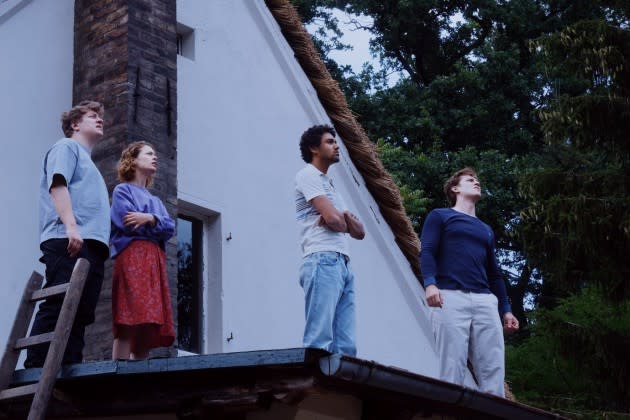Berlin Film Festival Review: Christian Petzold’s ‘Roter Himmel’
- Oops!Something went wrong.Please try again later.

A cottage in the woods: isolated, idyllic and unavoidably reminiscent of some half-forgotten fairy tale. Unfortunately, Leon (Thomas Schubert) is not a country person. When his friend Felix’s car breaks down on the forest road on the way to the family holiday house where they both plan to work in peace and quiet, all Leon can hear are unnerving crackles in the undergrowth. Wild boar. Leon is definitely not a wild boar kind of guy.
The car will have to stay where it is. Felix (Langston Uibel) knows a shortcut through the woods. When they reach the house, however, they find it obviously already occupied by someone else. Someone who leaves dirty dishes and food on every available surface. Flies! Leon is a writer. He doesn’t do boar; he doesn’t do flies. The interloper evidently is a woman; Felix’s mother forgot to tell them about her. Felix shrugs it off; he is more concerned about mold on the ceiling that suggests the roof is leaking. Leon is by now mutinously out of sorts.
More from Deadline
Another two nights will go by before he and Felix meet Nadja (Paula Beer), their unexpected housemate. They only hear her through the wall of the bedroom they are now obliged to share, sighing and moaning through bouts of sex that seem to Leon to last forever. He resorts to sleeping outside. Mosquitoes! Meanwhile, he anxiously anticipates the arrival of his publisher to discuss the new manuscript he has just finished. His editor, Helmut (Matthias Brandt), has described Leon’s writing as exciting and promising. It’s obvious to Leon that he hates it.
German writer-director Christian Petzold is a master of unsettled worlds; his film Barbara deals with Stasi informers in the old GDR, while Phoenix centers on a character whose face has been remade. In Roter Himmel (Afire), he plays that sense of uncertainty for comedy, but horror lies quite literally just over the horizon. A forest fire is raging beyond the hills; if Nadja and her new companions climb on the roof at night, they can see the sky glowing red. Sirens blare intermittently; helicopters fly overhead with water bombs, momentarily drowning out the insect buzz.
Between choppers, however, the house feels untouchable, even when ash rains on the lawn. Local lifeguard Devid (Enno Trebs) – who turns out to be the man Leon and Felix could hear through the wall – assures them that the constant wind from the sea will blow the fire in the opposite direction. They’re fine. Devid helps Felix fix the roof. Seeing problems and fixing them is what these men do. Nadja also proves she can jump in response to a crisis. Practicalities pass Leon by, however; real dangers, as opposed to the illusionary frisson of fear triggered by the sound of twigs breaking under a distant trotter, mean nothing to him.
Whether or not there is an element of self-parody here, Petzold certainly is writing about a world he knows. The isolated anxieties of the writer, the creative artist’s self-absorption – and self-importance, in Leon’s case – and the small but bruising failures in dealing with other people who seem so much better at living than you are: as a satire, Roter Himmel rings bracingly true. A series of set pieces dig gently but precisely at Leon’s little weaknesses. David tells a tiresome joke over their first dinner together; Leon responds by firing him with embarrassing questions that make everyone uncomfortable. Nadja falls off her bicycle; Leon stares at her sitting in a heap, not knowing what to do.
There are no great blowouts, however; Petzold’s tone is sardonic, sometimes snide, but there are no villains here. Schubert is such a sympathetic actor that we side with him even when he is exasperating. Devid’s dinner anecdote was, in fact, both tedious and tasteless. The insects are quite irritating, even on the soundtrack. The tensions, for all that they are observed with razor-sharp precision, are the minor ones of everyday life. The garden is bathed in sunshine, the wine flows. So while that red sky might suggest a coming apocalypse, its implications are easy enough to ignore; the inevitable disaster, when it comes, drops into their lives like a stone. Isn’t that what we’re all expecting? Petzold’s droll divertissement is a fable for our times.
Best of Deadline
Sign up for Deadline's Newsletter. For the latest news, follow us on Facebook, Twitter, and Instagram.

